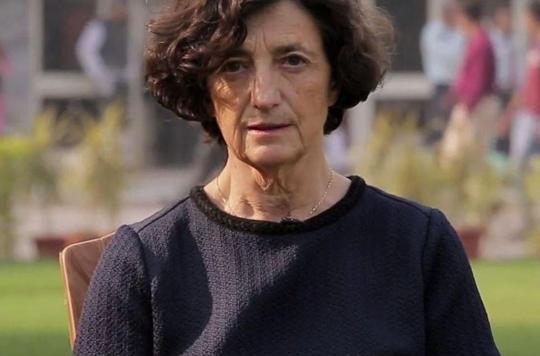This Thursday, the National Assembly adopted a resolution that recognizes people suffering from prolonged symptoms of Covid-19. But concretely, the disease is still not supported by the health system. Dominique Salmon-Ceron is a professor and infectious disease specialist at the Hôtel Dieu in Paris. She works in the post-Covid consultation center set up since May 2020 to take care of these patients.

Friday, February 12, the High Authority for Health (HAS) for the first time issued recommendations for the management of long Covid. This Wednesday, the Assembly took a new step by adopting a resolution which recognizes people suffering from prolonged symptoms of Covid-19. To take care of these patients, a post-Covid consultation center has been set up at the Hotel Dieu in Paris. Dominique Salmon-Ceron is a professor and infectiologist there.
– Why Doctor – What is a long Covid?
Dominique Salmon-Ceron – This name is popular language because the medical community and the World Health Organization (WHO) have not yet ruled. It is also not known whether this is due to prolonged Covid or post-Covid illness. We call this “prolonged Covid symptoms”. This mainly concerns patients who had outpatient symptoms and who have symptoms that persist or new ones that appear 4 weeks after infection.
In the current state of knowledge, we simply know how to describe them. We know the symptoms but we don’t know the cause. There are several hypotheses. The first is that the virus has remained in the body. Another theory points to inflammatory responses that persist in patients. We can also think that this is due to autoimmune reactions but this seems unlikely to us. Nor is it certain that there is a single explanation. Another hypothesis is that long Covids often appear in patients who have allergies and there would then be a particular genetic background.
– How is the Covid long unit set up at the Hôtel Dieu organized?
She was born in May of last year, during the first wave. The Hôtel Dieu was then transformed into outpatient care for Covid patients. The sick were divided into two categories, those who were very sick who were hospitalized and those who were well and who returned home. Then, some time later, some patients came back saying they still had symptoms. The hospital then opened a post-Covid consultation center. We immediately had a lot of people. We realized that a new phenomenon, a new disease was appearing. Subsequently, the consultations were standardized by a questionnaire through which the patients described their symptoms. We also wanted to have their medical history, to know if they are smokers, if they have a psychiatric illness. They also had to describe their initial Covid, the post-Covid manifestations and the treatments they had taken. We have around 200 patients who have already gone through our services, but these consultations are a bit the tip of the iceberg since we only see those who are not doing so well. Having persistent symptoms is not uncommon, about 10% of patients are in this case in the 4 to 6 months following their contamination.
– What did these first long Covid patients suffer from?
The questionnaires allowed us to make groupings among the patients since the symptoms are very heterogeneous. The main recurring symptom is fatigue, often triggered by exertion. Then there are neurological signs with concentration and memory disorders. Patients often complain of headaches and burns. There are also chest signs, shortness of breath and tachycardia. But there are plenty of other symptoms that can present themselves, such as digestive, skin and ENT disorders.
– How is the patient care going?
Gradually we were able to refer patients to specialist doctors. At the hospital, we have a network of contacts with cardiologists, neurologists, dermatologists… Patients also need psychological support, so we also refer them to psychiatrists. For those who have one or two affected organs, this support is sufficient and following the recent recommendations of the High Health Authority, city doctors will also be able to guide them. For others, it will require specialized services because some have symptoms that affect several organs and they need comprehensive care.
– What difficulties do you face?
There is a lack of strong support for research. It should not be purely descriptive as it is now, but we should be able to make fundamental explorations. We have great difficulty obtaining credits even though we have filed protocols on multiple occasions. We also need support for the creation of specialized centers that can take care of patients in a multidisciplinary way. They have big needs. The HAS recommendations are a first step and will help general practitioners. They have to tackle the problem head on, even if it’s not easy. To fully understand what the patient is suffering from, the consultations must be long. What we would need is an antiviral. We have the vaccines, but after a while we still don’t have an antiviral that works on the virus. This would prevent the occurrence of long Covid.
– What would you advise a long Covid patient?
He needs to go see his doctor. It starts there. The doctor must listen to him. He can then receive symptomatic treatments, such as anti-inflammatories and others. He must know that the symptoms will evolve and that his situation will gradually improve over time. But it doesn’t happen in a few days, it’s quite a long time. We must not lose courage and these patients must learn to self-manage, particularly in terms of effort since we see that they are often tired very quickly. They need to recognize what is causing these flare-ups and adapt.
What worries us more are the neurological signs. In a minority of patients, they persist. They can no longer resume their work. These neurological damages are what we fear the most. The scanners that we were able to perform revealed hypometabolism in certain regions of the brain. It is rather worrying. At the same time, this persistence of symptoms has a psychological impact. People are anxious and develop depressive syndromes. We also wonder if this does not affect their situation. Patients should not be allowed to isolate themselves and become depressed.
– Why are long Covids not sufficiently recognized?
Initially, research focused on resuscitation and mortality. Which is normal. There, we see many patients with significant sequelae. There is research going on. France struggled to accept this long Covid term. Since July, I have been warning about this problem and it was only at the end of last year that the health authorities took up the subject. Several deputies have made requests for a bill to have it recognized as an occupational disease and covered by social security. Support centers should appear. We have fallen behind but now we are aware of the phenomenon.
– Do the variants have an effect on long Covids?
It is too early to know. What I observed is a first salvo of patients who contacted us at least last May. There was a little less at the end of the year but there, it’s not bad. This corresponds to the wave of contamination that occurred between October and December. When we received the first patients last May, we only thought we’d see them once. We had no idea that it would become chronic. There are some that we continue to receive. We are going to do a one-year follow-up to hear from all the patients to collect data and learn more about these long Covids. We would also like to be supported in our approach.

.

















